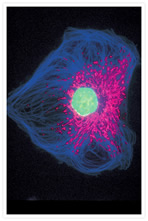Zebrafish brain. DiI and SYTOX® Green nucleic acid stain.
The tracer DiI (Cat. no. D282, D3911) used as a diagnostic tool to evaluate retinal and tectal patterns in a chimeric five-day-old zebrafish brain. Acerebellar (Fgf8) is required for development of midbrain polarity and correct retinotopic mapping of retinal ganglion cell axons. One eye of this brain was wild type, whereas the other was mutant for fgf8 (derived from homozygous acerebellar donors). The chimera was obtained by transplanting eye primordia, and the eyes were subsequently removed for photography. Retinal ganglion cell axons in the dorsonasal retina were labeled with DiI and nuclei were counterstained with SYTOX® Green nucleic acid stain (Cat. no. S7020). Axons from the right, wild-type eye terminate correctly in the posterior tectum only, whereas axons from the left, mutant eye terminate inappropriately in the anterior and posterior tectum. This digital image, previously published on the cover of Development 125 (13) (1999), was created by Alexander Picker and Michael Brand, Neurobiology, University of Heidelberg. The image is used with the permission of The Company of Biologists, Ltd.

Related Products
Related Images
Developing Drosophila embryo Go ›

Cytoskeleton of a mixed population of granule neurons and glial cells Go ›

Cyanobacteria. BODIPY® FL, DAPI and CellTracker™ Green BODIPY®. Go ›

Immunofluorescent Staining using Mouse HuC/HuD Neuronal Protein Monoclonal Antibody, Biotin-XX Conjugate. Go ›

1% Agarose gel containing 16S and 23S ribosomal RNA (rRNA). SYBR® Green II RNA gel stain. Go ›

Bovine pulmonary artery endothelial cells (BPAEC). MitoTracker® Red CMXRos, SYTOX® Green nucleic acid stain, biotin-XX goat anti–mouse IgG antibody and Cascade Blue® NeutrAvidin biotin-binding protein. Go ›

CD335 (NKp46) Antibody (63335182) in RE Go ›

CD223 (LAG-3) Antibody (56223942) in TM Go ›
